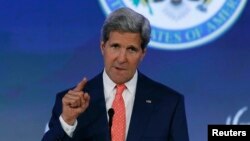Top officials from the United States and China are likely to focus on areas in which the two countries cooperate at the sixth round of the U.S.-China Strategic and Economic Dialogue this week. But, there are few expectations the meeting will bring substantial change to the relationship between the two governments.
U.S. Secretary of State John Kerry leads a delegation of top U.S. economic and diplomatic officials to Beijing for the annual talks, which begin Wednesday.
Some experts who study the relationship between the two countries say the delegation is likely to avoid public confrontation over bilateral economic and security problems.
Cheng Li, director of the China Center at the Brookings Institute, says both countries could play it safe this week to create a better atmosphere for President Barack Obama’s potential visit to Beijing later this year for the Asia-Pacific Economic Cooperation (APEC) meeting.
“There’s another important meeting will be in November, the APEC meeting, and President Obama will visit China, will probably have a state visit during that period," he said. "So I think it is important for both countries to emphasize their strong ties, their common interests, rather than going to the other direction, which is very, very disturbing.”
That disturbing direction would be off China’s shores, where the economic giant is accused of aggressively trying to expand its maritime control. It's a dangerous situation, says Li, and one that leaders in both countries need to address.
A State Department official has said the U.S. plans to raise the issue of China's claims to most of the South China Sea and a large part of the East China Sea. Vietnam, the Philippines and Japan dispute those claims, saying they extend into their maritime regions.
The U.S. also is expected to raise a variety of economic and security issues, including China's cyber spying.
Bonnie Glaser with the Center for Strategic and International Studies in Washington, says major breakthroughs are unlikely this week.
She says the focus instead may be on cooperation.
"On the strategic side, there are issues that I think are positive that the U.S. and China will talk about," she said. "Continued cooperation on Iran. Some nascent cooperation in Afghanistan. And of course, their shared desire to denuclearize North Korea. Although I think there probably won't be any major achievements there."
On Monday, the State Department avoided specifics about its agenda for the talks, with a spokeswoman telling reporters to "stay tuned" for the meetings on Wednesday and Thursday.




